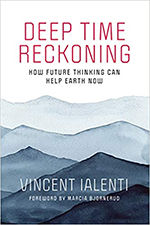 Stereotypically, I think of anthropologists as scholars who head off into years-long sojourns embedded with indigenous peoples, learning their cultures, practices, and insights. Vincent Ialenti has shown me that modern anthropologists can study other groups too. Ialenti’s population of interest is a modern group of European geoscientists, nuclear engineers, and planners. Together, they are charged with planning for the integrity of a Finnish nuclear waste repository. But studying this group, called “the Safety Case,” has led the author into a non-traditional direction. His dissertation research inspired him, for his subjects thought about time differently from “normal” people. Geologists won’t find this shocking, to think in Deep Time – both backward and forward over millions of years, but it appears to have been profoundly insightful to Ialenti. He reworked his anthropological documentation into an unusual book that simultaneously attempts to report on the nitty-gritty of a very specialized academic study but also spin off grand lessons for humanity at large. I picked it up for the latter, but was willing to indulge in the former. I felt the book was at its strongest when it articulated a vision for the future where Deep Time thinking is integrated into educational curriculum, if not into the wider culture, but the academic anthropological descriptions of Finnish bureaucrats didn’t engage me as much as Ialenti appears to think it should. Similarly, the end-of-chapter exercises in practicing Deep Time thinking (which he calls “reckonings”) didn’t feel especially novel to me, but I am a geologist who is quite comfortable toggling back in time to the Cambrian, or forward 10 million years into the future. I’m probably not the target audience because I’m already sold on the main conclusion, and I would be curious to hear whether novices find these activities mind-expanding. I agree with Ialenti’s premise: that our species and our world benefit if we think about the very, very long-term consequences of our actions or inactions. Replacing short-sightedness with looooooooooooong-sightedness is an unalloyed benefit, I’d argue too. How can we be responsible ancestors to the future of our species; the future of life? Deep Time Reckoning comes at this question from a unique direction, and offers clear guidance for our common future.
Stereotypically, I think of anthropologists as scholars who head off into years-long sojourns embedded with indigenous peoples, learning their cultures, practices, and insights. Vincent Ialenti has shown me that modern anthropologists can study other groups too. Ialenti’s population of interest is a modern group of European geoscientists, nuclear engineers, and planners. Together, they are charged with planning for the integrity of a Finnish nuclear waste repository. But studying this group, called “the Safety Case,” has led the author into a non-traditional direction. His dissertation research inspired him, for his subjects thought about time differently from “normal” people. Geologists won’t find this shocking, to think in Deep Time – both backward and forward over millions of years, but it appears to have been profoundly insightful to Ialenti. He reworked his anthropological documentation into an unusual book that simultaneously attempts to report on the nitty-gritty of a very specialized academic study but also spin off grand lessons for humanity at large. I picked it up for the latter, but was willing to indulge in the former. I felt the book was at its strongest when it articulated a vision for the future where Deep Time thinking is integrated into educational curriculum, if not into the wider culture, but the academic anthropological descriptions of Finnish bureaucrats didn’t engage me as much as Ialenti appears to think it should. Similarly, the end-of-chapter exercises in practicing Deep Time thinking (which he calls “reckonings”) didn’t feel especially novel to me, but I am a geologist who is quite comfortable toggling back in time to the Cambrian, or forward 10 million years into the future. I’m probably not the target audience because I’m already sold on the main conclusion, and I would be curious to hear whether novices find these activities mind-expanding. I agree with Ialenti’s premise: that our species and our world benefit if we think about the very, very long-term consequences of our actions or inactions. Replacing short-sightedness with looooooooooooong-sightedness is an unalloyed benefit, I’d argue too. How can we be responsible ancestors to the future of our species; the future of life? Deep Time Reckoning comes at this question from a unique direction, and offers clear guidance for our common future.
